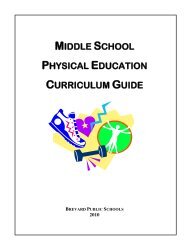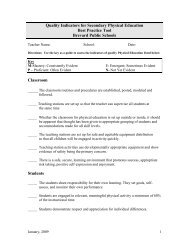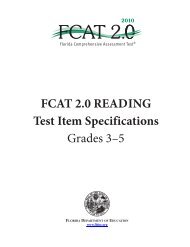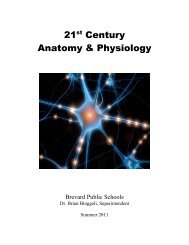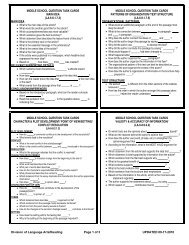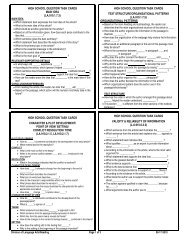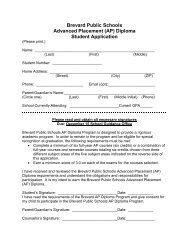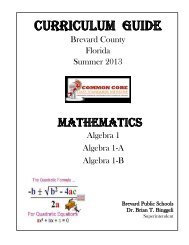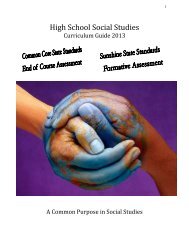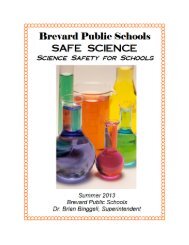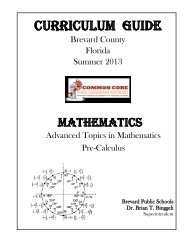Science Research Program Guide - Secondary Programs Home ...
Science Research Program Guide - Secondary Programs Home ...
Science Research Program Guide - Secondary Programs Home ...
Create successful ePaper yourself
Turn your PDF publications into a flip-book with our unique Google optimized e-Paper software.
When students conduct research with human subjects, the<br />
rights and welfare of those participating in the study must be<br />
protected. There are federal regulations protecting human<br />
subjects that require the prior review of human subjects<br />
research by an Institutional Review Board and, in most cases,<br />
the informed consent of research subjects. The following rules<br />
were developed to help student researchers adhere to the<br />
Federal regulations and to, therefore, protect the rights and<br />
welfare of both the research subjects and the student<br />
researcher.<br />
Rules<br />
1) All research projects involving human subjects, including<br />
any revisions, must be reviewed and approved by an<br />
Institutional Review Board (IRB) before the research<br />
begins.<br />
2) The use of human subjects in science projects is allowable<br />
under the conditions and rules in the following sections.<br />
Based upon the Code of Federal Regulations (45 CFR 46),<br />
the definition of a human subject is a living individual<br />
about whom a investigator conducting research obtains (1)<br />
data or samples through intervention or interaction with<br />
individual(s), or (2) identifiable private information.<br />
A) Examples of studies that are considered “human<br />
subjects research” and require IRB approval include:<br />
• Subjects participating in physical activities (e.g.,<br />
physical exertion, ingestion of any substance, any<br />
medical procedure)<br />
• Psychological, educational and opinion studies (e.g.,<br />
surveys, questionnaires, tests)<br />
• Studies in which the researcher is the subject of the<br />
research<br />
• Behavioral observations<br />
o that involve any interaction with the observed<br />
individual(s) or where the researcher has modified<br />
the environment (e.g., post a sign, place an<br />
object).<br />
o that occur in a non public or restricted access<br />
settings (e.g., day care setting, doctor’s office)<br />
o that involve the recording of personally<br />
identifiable information<br />
• Data/record review projects that include identifiable<br />
data (see #3)<br />
B) Examples of projects that are NOT considered human<br />
subjects research and do not require IRB pre-approval<br />
include:<br />
• Product testing of a student invention that does not<br />
pose a health hazard, personal data is not collected<br />
and feedback received is a direct reference to the<br />
product. It is recommended that Risk Assessment<br />
Form (3) be completed.<br />
• Data/record review studies (e.g., baseball statistics,<br />
crime statistics) in which the data are taken from preexisting<br />
data sets that are publicly available or<br />
published (see #3-c)<br />
� Human Subjects �<br />
• Behavioral observations of unrestricted, public settings<br />
(e.g., shopping mall, public park) in which all of the<br />
following apply:<br />
o The researcher has no interaction with the<br />
individuals being observed,<br />
o The researcher does not manipulate the<br />
environment in any way and<br />
o The researcher does not record any personally<br />
identifiable data.<br />
3) Projects involving pre-existing data sets or data obtained<br />
through record review fall into one of three categories (a, b,<br />
and c below) and must adhere to the regulations detailed<br />
below. Pre-existing data set/review projects are projects that<br />
do not involve any interaction with human subjects or the<br />
collection of any data from a human subject for the purpose<br />
of the student’s research project. These projects may<br />
involve the student analyzing data given to the student<br />
researcher in paper or electronic form.<br />
a) Projects in which the data are not de-identified/<br />
anonymous (e.g., data set that includes patient name,<br />
birth date, phone number or other identifying variables;<br />
student gathers data from patient files that include<br />
identifiers) are considered human subjects projects.<br />
These projects require prior IRB review and preapproval<br />
and may require informed consent. Student<br />
researchers and adult mentors (Designated Supervisor<br />
or Qualified Scientist) should be familiar with and in<br />
compliance with all privacy and HIPAA laws.<br />
b) Projects in which the student receives the data in a deidentified/anonymous<br />
format will not require IRB preapproval,<br />
but must comply with BOTH conditions<br />
below:<br />
i) The professional providing the data must certify in<br />
writing that the data have been appropriately deidentified<br />
and are in compliance with all privacy and<br />
HIPAA laws.<br />
ii) During the final SRC review and approval process,<br />
the SRC must ensure that the data were appropriately<br />
de-identified by review of the written documentation<br />
provided by the supervising professional.<br />
c) Projects in which the records/data are publicly available<br />
(print, electronic or internet) do not require IRB review<br />
or approval. Examples of such projects include<br />
examination of sports teams or individual athlete<br />
statistics or crime statistics.<br />
4) When developing the <strong>Research</strong> Plan, student researchers<br />
must evaluate and minimize the physical and/or<br />
psychological risks to their human subjects.<br />
5) The documentation of written Informed Consent is required<br />
for most projects. Children/Minors participating in most<br />
research will require special consent procedures<br />
including assent of the child/minor and consent of the<br />
parent/guardian. Children/Minors are persons who have<br />
not attained the legal age for consent; in most jurisdictions<br />
the legal age is 18 and in some jurisdictions this may include<br />
all students still in secondary school.<br />
International Rules for Precollege <strong>Science</strong> <strong>Research</strong>: <strong>Guide</strong>lines for <strong>Science</strong> and Engineering Fairs / 2008-2009 Page 13



